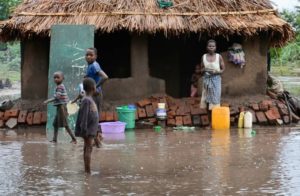By Staff Reporter
The Department of Climate Change and Meteorological Services has predicted flash floods in some parts of Chikwawa, Nsanje and other lakeshore areas following heavy rains in the Southern Region that has been falling for three consecutive days now.
In a statement, the department further says strong winds and lightning are also anticipated, urging the public to be on high alert mainly in the flood prone areas.
“It is advisable to plan travels properly and avoid crossing fast flowing and flooded waters.
“The public is further advised to avoid resting and packing under trees and wet fences.

“Torrential rains can weaken some structures; therefore, the public is reminded to keep on inspecting houses and other buildings for possible damages to avoid walls collapsing on people,” reads the statement in part.
Meanwhile, disaster management department says it has set standby arrangements for the deployment of a search and rescue team comprising the Malawi Defence Force, the Malawi Police Service and the Marine Department to the lower Shire districts of Nsanje and Chikwawa.
“Councils and residents should clear all drainage systems to make sure that water is given ample drainage space and avoid flooding.
“If you can manage, provide first aid treatment to the injured and those in shock and call for medical help,” reads a statement by Dodma.
Malawi is a country which is particularly prone to adverse climate hazards that include dry spells, seasonal droughts, intense rainfall, riverine floods, and flash floods. Droughts and floods, the most severe of these hazards, have increased in frequency, intensity, and magnitude over the past twenty years, with dire consequences on food and water security, water quality, energy resources, and sustainable livelihoods of the most rural communities.
From 1979 to 2008, 2,596 people perished due to natural disasters, and nearly another 21.7 million people were adversely affected.










